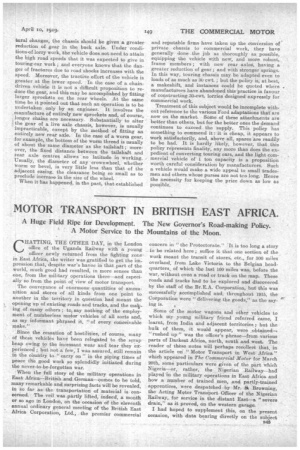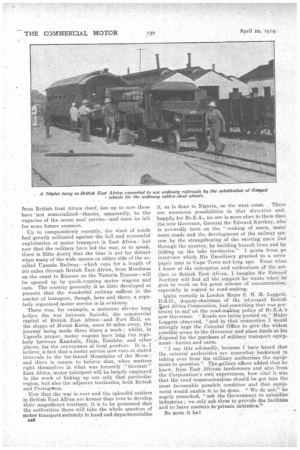MOTOR TRANSPORT IN BRITISH EAST AFRICA.
Page 17

Page 18

If you've noticed an error in this article please click here to report it so we can fix it.
A Huge Field Ripe for Development. The New Governor's Road-making Policy. A Motor Service to the Mountains of the Moon.
CHATTING, THE OTHER DAY, in the London office of the Uganda Railway with a young officer newly returned from the fighting zonein East Africa, the writer was gratified to get the impression that, despite war's havoc in that part of the world, much good had resulted, in more senses than one, from the military operations there—and especially so from the point of view of motor transport.
The conveyance of enormous quantities of ammunition and stores of all kinds from one point to another in the territory in question had meant the , opening up of existing roads and tracks, and the malie ing of many others ; to, say nothing of the employment of numberless motor vehicles of all sorts and, as my informant phrased it, "of every conceivable • make."
Since the cessation of hostilities, of course, many Of these vehicles have been relegated to the scrap heap owing to the incessant wear and tear they experienced ; but not a few, I was assured, still remain in the COuntry to " carry on" in the piping times of peace the good work so splendidly initiated during the never-to-be-forgotten war. , When the full story of the military operations in East Africa—British and, German--comes to be told, many remarkable and surprising facts will be revealed, in so far as the transportation of matmial is concerned. The veil was partly lifted, indeed, a month or so ago in London, on the occasion of the eleventh annual ordinary general meeting of the British East Africa Corporation, Ltd., the premier commercial concern in "the Protectorate." It is too long a story to be related here ; suffice it that one section of the work meant the transit of stores, etc.,. for 300 miles overland, from Lake Victoria to the Belgian headquarters, of which the last 100 miles was, before the war, without even a road or track on the map. These roads and tracks had to be explored and discovered by the staff of the Br.E.A. Corporation, but this was successfully accemplisheci and, throughout 1915, theCorporation were "delivering the goods," as the sayv. ing is.
Some of the motor wagons and othef vehicles to which my young military' friend referred came, I learnt, from India and adjacent territoriee; but the bulk of them, it would appear,' were obtained--• " rushed up" was the officer's phrase—from various parts of Darkest Africa, north, south and :west. The reader of these notes will perhaps recollect that, in the article on "Motor Transport in West Africa" which appeared in The Commercial Motor for March 20th, some particulars were given of the part which Nigeria—or, rather, the Nigerian Railway—had played in the military operations in East Africa and how a number of trained men, and partly-trained apprentices, were despatched by Mr. 090, Browning, the Acting Metor Transport Officer of the Nigerian Railway, for service in the distant East—a "severe drain," as it proved, on the western garage.
I had hoped to supplement this, on the present occasion, with data bearing directly on the subject from British East Africa itself, but up to now these have not materialized—thanks, apparently, to the vagaries of the ocean mail service—and must be left for some future occasion.
Up to comparatively recently, the want of roads had greatly militated against the full and successful exploitation of motor transport in East Africa : but now that the military have led the way, so to speak, there is little doubt that the time is not far distant when many of the wide spaces on either side of the socalled Uganda Railway—which runs for a length of 584 miles through British East Africa, from Mombasa on the coast to Kisumu on the Victoria Nyanza—will be opened up by quick-running motor wagons and -cars. The country generally ii so little developed at present that the wonderful railway, suffices in the matter . of transport, though, here and there, a regularly organized motor service is in evidence.
There .was, for example, a motorcar service long before the war between Nairobi, the eonninereial capital of British East Africa—and Fort Hall, on the slopes of Mount Kenia, some 50 miles away, the journey being made three times a week ; whilst, in Uganda proper, motor wagons have long run regularly between Kambala, Jinja, Entebbe, and other places, for the conveyance of local produce. It is, I believe, a fact that a motor service now runs at stated intervals to the far-famed Mountains of the Moon :and there is reason to believe that, when matters right themselves in what was formerly "German " East Africa, motor transport will be largely employed in the work of linking up not only that particular region, but also the adjacent territories, both British and Portugaiese.
Now that the war is over and the splendid settlers in British East Africa are keener than ever to develop their magnificent territory, it is to be presumed that the authorities there will take the whole question of motor transport seriously in hand and departmentalize B48 it, as is done in Nigeria, on the west coast. There are enormous possibilities in -that direction and,, happily for Br.E.A., no one is more alive to them than the new Governor, General Sir Edward Northey, who is. avowedly bent on the "making of many, many more roads and the development of the railway system by the strengthening of the existing main line through the country, by building branch lines and by linking up the lake territories." I quote from an interview which .His Excellency granted to a newspaper man in Cape Town not long ago. From what I know of the enterprise and enthusiasm of the settlers in British East Africa, I imagine Sir Edward Northey Will find all the support he wants when he gets to work on his great scheme of reconstruction, especially in regard to road-making.
Quite recently in London Major E. H. M. Leggett, D.S.O., deputy-chairman of the .aforesaid British cast: Africa Corporation, had something that was per Orient to sayon the road-making policy of Br.E.A.'s new Governor. Roads are being pushed on," Major Leggett observed, "and in that connection I would strongly urge the Colonial Office to give the widest possible scope to the Governor and place funds at his disposal for the purchase of military transPort equipment—lorries.and carts.
"I say this advisedly, because I have heard that the. colonial authorities are somewhat backward in taking over from the military authorities the equipment in question." The gallant officer added that he knew, from East African landowners and also from the Corporation's iown experiences, how vital it was that the road communications should-be got into the most favourable possible condition and that equipment would enable it to be done. "We do not," he sagely remarked, "ask the Government to subsidize industries ; we only ask them to provide the facilities and to leave matters to private initiative."
So mote it be I






















